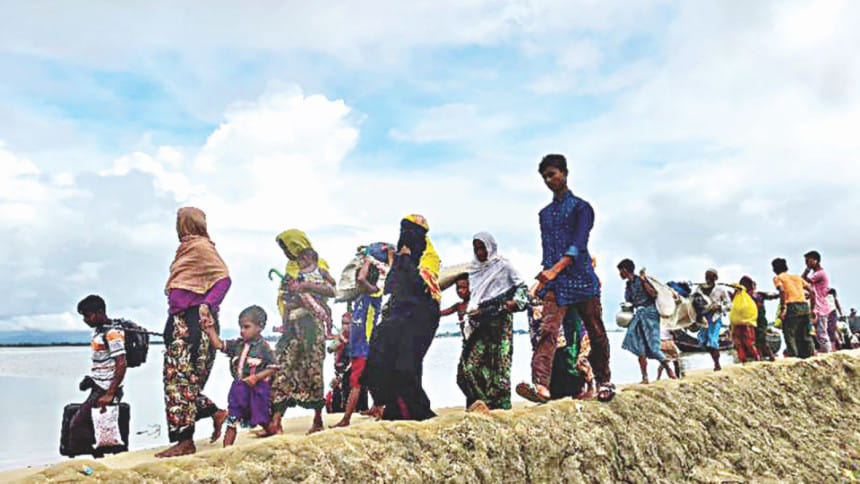Myanmar's irrational denial of citizenship to Rohingyas

The exodus of Rohingyas, one of the most persecuted minorities in the world, from Myanmar to neighbouring countries is not a new phenomenon. Historically, Rohingyas have been fleeing to Bangladesh, Malaysia, Thailand, and other neighbouring counties to escape serious repressions in Myanmar. One of the key issues of contention regarding the Rohingya crisis is the question over their citizenship. Denial of citizenship poses serious obstacles in achieving a durable solution to the Rohingya refugee flows.
There are two schools of thought that analyse the controversy related to the existence of Rohingyas in Myanmar. One of these perspectives comes from the proponents of the government of Myanmar and its Buddhist-led population. They consider Rohingyas as "outsiders" and "foreign residents of Myanmar". According to this perspective, Rohingyas are the direct descendants of immigrants from Chittagong of East Bengal, present-day south-eastern region of Bangladesh. Rohingyas are, thereby, referred to as "Bengali" in Myanmar's state media, official policy documents, and school textbooks as well. They are also portrayed as a threat to Myanmar's national security.
The "1982 Citizenship Law" enacted by Myanmar's military government refer to "Nationals such as the Kachin, Kayah, Karen, Chin, Burman, Mon, Rakhine or Shan and ethnic groups as have settled in any of the territories included within the State as their permanent home from a period prior to 1185 B.E., 1823 A.D. are Burma citizens". It clearly denotes that Myanmar's citizens are those persons whose ancestors settled in the country before 1823, the beginning of British occupation of Arakan, present-day northern Rakhine State. Myanmar authorities claim that Rohingyas settled in Arakan after its annexation by the British in 1824.
On the other hand, the stance of Myanmar's Buddhist majority and its authority is strongly contested by the government of Bangladesh, the Rohingya themselves, foreign governments, international organisations and scholars. Bangladesh claims that Rohingyas are Myanmar nationals and they have reportedly entered the territory of Bangladesh through illegal means. Rohingyas are the Muslims of Myanmar who have lived in Arakan for a long period of time.
As far as the debate is concerned, there is a question that needs to be answered: whether Rohingyas are illegal immigrants from Bangladesh or not. How plausible are the arguments proposed by the government of Myanmar? In this regard, it is important to re-examine the history of Rohingyas' settlement in Arakan.
If we look at the first claim projected by Myanmar's military junta about the "illegal immigrants from Bangladesh", the evidences accumulated from historical facts and scholarly documents do not comply with this proposition. The clarification of this non-compliance can be reiterated from in-depth observation.
Historical evidence show that Rohingyas are Muslims whose settlements in Arakan date back to the 7th century C.E., long before the British colonial rule in the Indian subcontinent. Some scholarly documents mention that Rohingyas have been living in the Rakhine State since the 8th century. The Human Rights Watch traces the well-established presence of Rohingyas in the Mrauk-U (Mrohaung) kingdom in Arakan, now Rakhine State. It has also been mentioned that Rohingya Muslims had ruled over Arakan for more than 250 years until Burmese invasion and occupation of Arakan in 1784 C.E. Such evidence can also be found from the records of Francis Buchanan. He wrote, "I shall now add three dialects, spoken in the Burma Empire, but evidently derived from the language of the Hindu nation. The first is that spoken by the Mohammedans, who have long settled in Arakan, and who call themselves 'Rooinga', or natives of Arakan."
At that time it was not only the Bengalis who entered into Arakan for better livelihood opportunities; the Arakanese arrived in Chattogram, the then Chittagong, as well. When the Burmese invaded and conquered Arakan in 1784, Rohingyas were conquered and incorporated into the majority Buddhist kingdom of Burma. As a result, considerable numbers of Rohingyas sought refuge in Chattogram and Cox's Bazar. Some Rohingyas assimilated into the Bengali community because of their cultural and linguistic similarities with the people living in Chattogram.
It is also important to note that during the British rule of the Indian subcontinent and Burma, movement of people was considered as "internal movement", from one district to another within the same political entity. Chattogram came under the British rule in 1760, while after the end of three Anglo-Burmese Wars (1824-1826, 1852-1853, and 1885), Burma became a part of British India (1886-1937). The borders of the British Indian Empire were extremely porous prior to the colonial period and during its initial phases. Consequently, people could easily move across the region without permission or legal documents. In addition, it was British policy to move populations between the then East Bengal and Burma to suit their labour needs that triggered intra-regional labour flows. As a result, a considerable level of movement occurred across the region during that period, mostly for economic purpose which was considered as normal seasonal migration.
It is, therefore, meaningless to term people's movement as well as their settlements at that time between the two parts—Arakan of Burma and the then Chittagong Division of Bengal in British India—as illegal. The question of illegal immigration only comes after the demarcation of borders among independent states.
Given this above-mentioned analyses, it is no longer rational or reasonable to claim Rohingyas as "Bengalis" or "illegal immigrants from Bangladesh". Rather they have historically been living in Arakan. Unless their status of ethnicity is recognised or resolved, the long-term solution of the Rohingya crisis will remain questionable.
Sultana Yesmin is a PhD Candidate at the School of Politics and International Studies (SPIS), Central China Normal University, Wuhan, Hubei, China.
Email: [email protected]





Comments